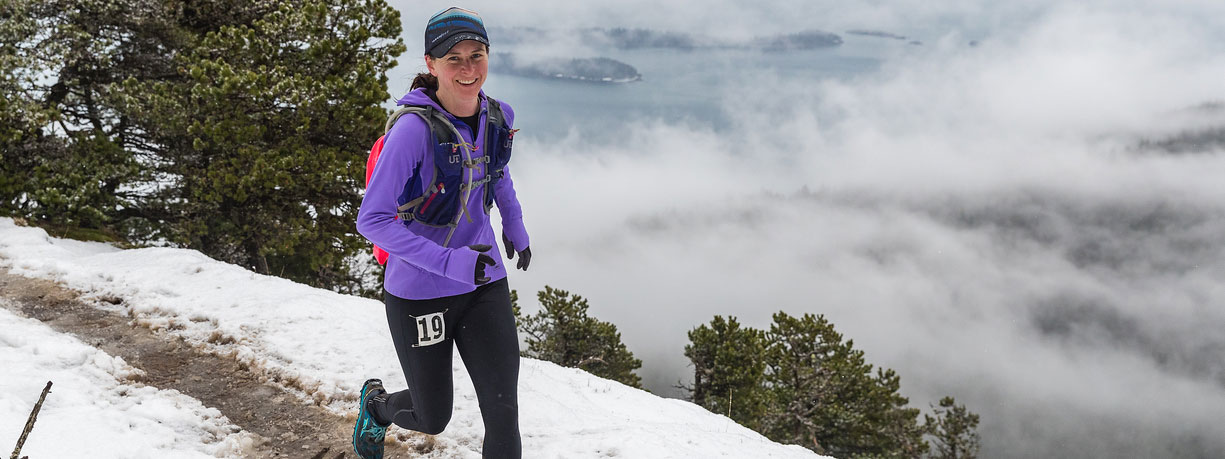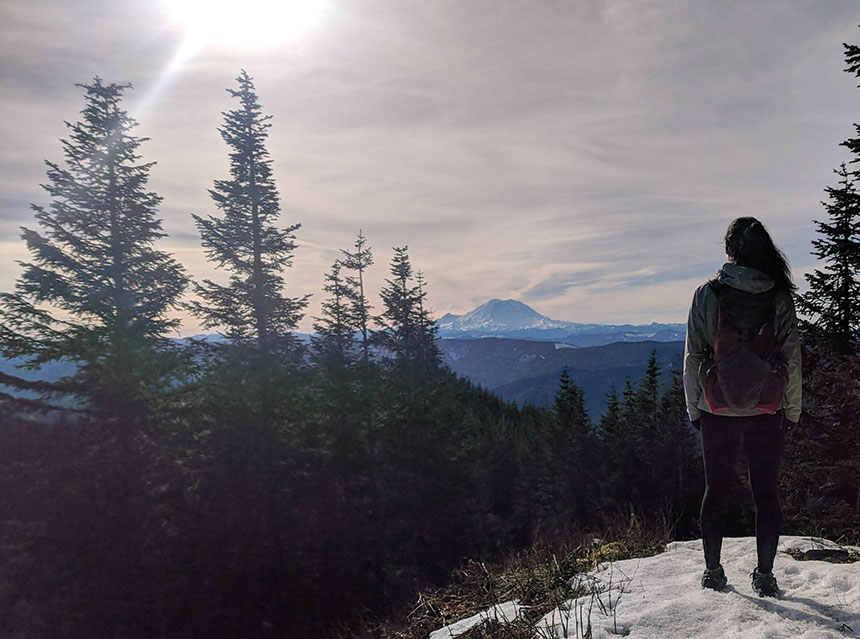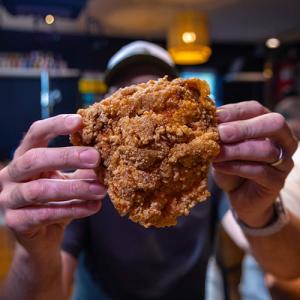
Ultra-Marathon Educator
Ellen Bayer's passion for the outdoors guides her work both in and out of the classroom.
The picture on Assistant Professor Ellen Bayer’s Instagram page is gnarly. The photo is a close up of her leg. The limb looks like it’s been “attacked by a cougar” as one commenter puts it. Bayer’s leg is covered in angry red cuts. At first glance you wonder if she’s been in an accident. But, no, these injuries were not the result of misadventure. Ellen Bayer started that day fully expecting, maybe even hoping, to have her leg sliced and gouged as part of the Barkley Marathons.
The race is considered to be one of the most difficult, if not the most difficult, ultra-marathons in the world. The course is a series of five, 20-mile loops with steep elevation gains — think 2,000 feet in a half-mile. One section, dubbed “Rat Jaw,” is covered in saw briars like that ones that hacked at Bayer’s legs.
Bayer is an ultra-marathoner, a sport she took up in her mid-thirties. Bayer is passionate about the outdoors and works to help her students have meaningful experiences in nature. Bayer’s research focuses on how literature texts impact aesthetic preferences. For example, the English Ivy that overtakes yards and chokes out native plant life is partly due to Edgar Allan Poe’s nature tales.
Bayer is also working on a project that looks at the correlation between having a firsthand, personal experience in the natural world and a deeper sense of engagement, and commitment to addressing environmental issues.
Bayer talked about her teaching, research and life as an ultra-marathoner on the new UW Tacoma Podcast – Paw’d Defiance. Here are some excerpts. (Interview edited and condensed for clarity.)

Maria Crisostomo, Paw’d Defiance Host
Why do you take students outside? Is this a more effective way to understand environmental issues than listening to a lecture in class?
Ellen Bayer
I think if you can empower someone to access a space that they've felt marginalized from or excluded from, I think that can be really powerful.
We read about people going out and doing these exciting adventures and I think it reinforces for students that it doesn't have to just be somebody else in the book. It can be them too.
And when they come back and they tell their story, they get to realize that their story matters, their voice matters, and there's a space for it.
This all came from my very first environmental literature course that I taught my first year here.
From campus, from some of the buildings, you can see the mountain there [Mt. Rainier]. A student in class pointed to it, and she said, “I've looked at that mountain every day of my life and I've never been to it. I've never been able to go touch it.”
And it was just so heartbreaking to me to hear that, to think about. You see this thing, it has such a huge presence in your everyday life and yet you've never had the opportunity to go touch it. She had children, she was a single mom, she was working full time going to school full time and she just felt like she just didn't have the means or the time to go access it.
So she decided this was going to be a mission for her, to get to the mountain. I knew, in that moment, that was going to shape my time at UW Tacoma, and I was going to try and change that.
Maria
Is there a reason why you're so passionate about environmental studies?
Ellen
Yeah, that's good for me to try and articulate. I guess I would say that my parents divorced when I was pretty young and my dad moved to a farm in rural Indiana. My brother and I would spend our days playing in the creek and in the woods, and just kind of running around and living this really kind of almost enchanted childhood of being wild children in the forest.
So I always felt connected to the outdoors. We would go hiking and car camping and things like that, but it wasn't until I came to Washington that I started doing lots of more extreme outdoor adventures and getting into the back country and doing wild camping and just broadening my relationship to the natural world.
I'm really happier sleeping in a tent in the woods than I am anywhere else, or running along a ridge in the mountains.
Maria
Is that why you started doing ultra-marathons?
Ellen
This wasn't something I did when I was younger. I didn't run track or cross country in school.
When I was in my mid-thirties, a friend invited me to do a race. It was just five miles, but I trained really hard and it was really difficult. When I was out on the course -- the Mackinac Bridge in Michigan, which spans two of the Great Lakes -- the sun was coming up over the lakes and I'm just running, and the air was so crisp and I just in that moment was like, “Wow, I really love this.”
Shortly thereafter, when I moved to Washington, a friend took me running at Point Defiance on the trails and I just thought like, oh my gosh, what is this?
So I started running half-marathons and on trails and I just loved it. So then I decided to train for a marathon. Two weeks before my first marathon I broke my ankle and was very frustrated. While I was laid up on the couch in a cast recovering, I was just looking at, “Well, what else is there besides marathons?” That's when I started reading about ultra- marathons.
There's one in Washington called White River 50-Mile Endurance Run. I was like, “I want to run that.” So, after I healed up, everything was moving toward running the 50-miler. I remember the first time I ran 20 miles, I just had this very moving experience of like, I can't believe my legs have carried me this far.
More on Episode 4 of Paw'd Defiance: how Dr. Bayer awakens her students’ interest in the outdoors through class activities like hiking and sea kayaking.



